高中英语学业水平测试复习专题四语法填空语法项目(二)代词课件
文档属性
| 名称 | 高中英语学业水平测试复习专题四语法填空语法项目(二)代词课件 |

|
|
| 格式 | ppt | ||
| 文件大小 | 1.9MB | ||
| 资源类型 | 试卷 | ||
| 版本资源 | 通用版 | ||
| 科目 | 英语 | ||
| 更新时间 | 2025-03-17 09:45:14 | ||
图片预览

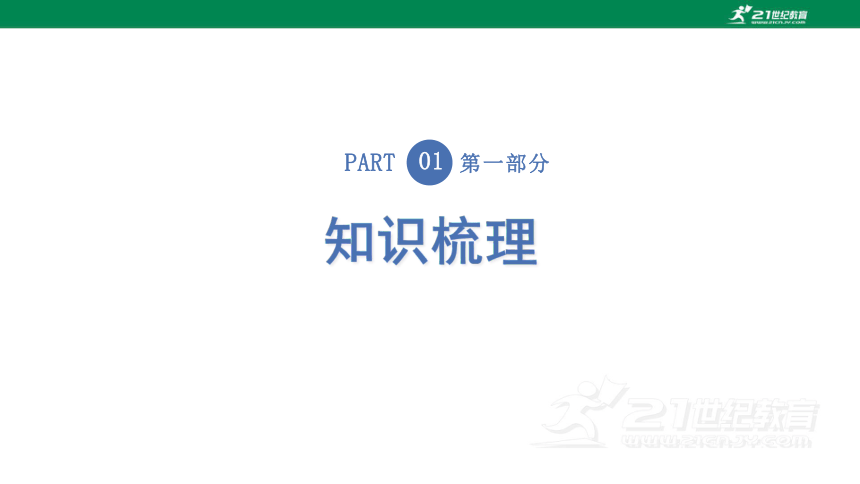
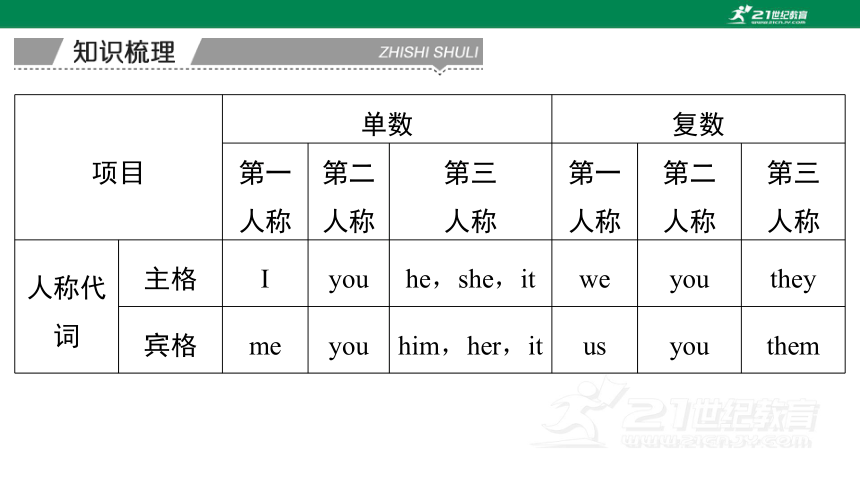
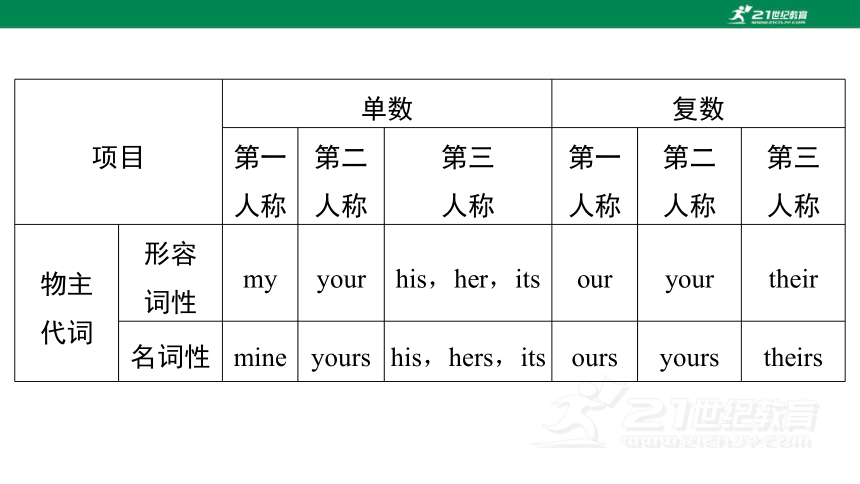
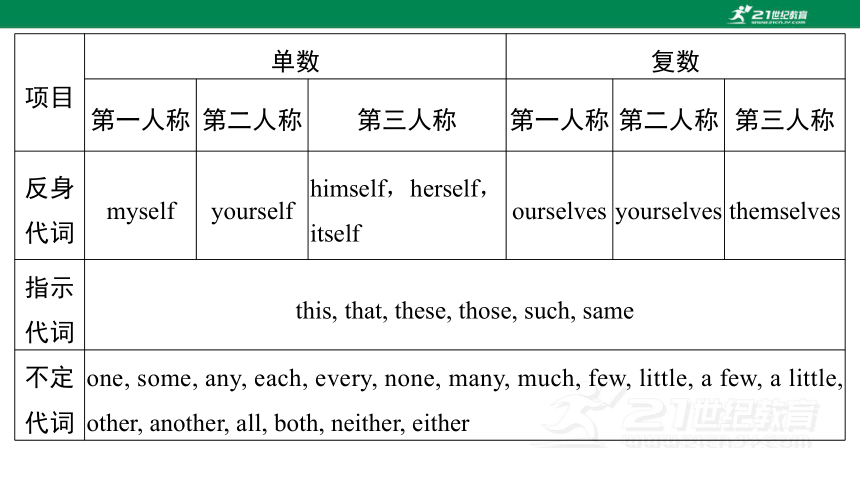
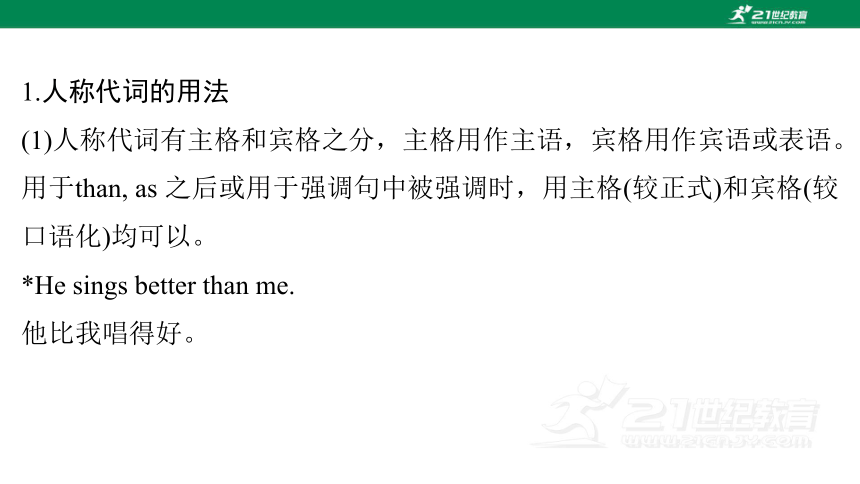
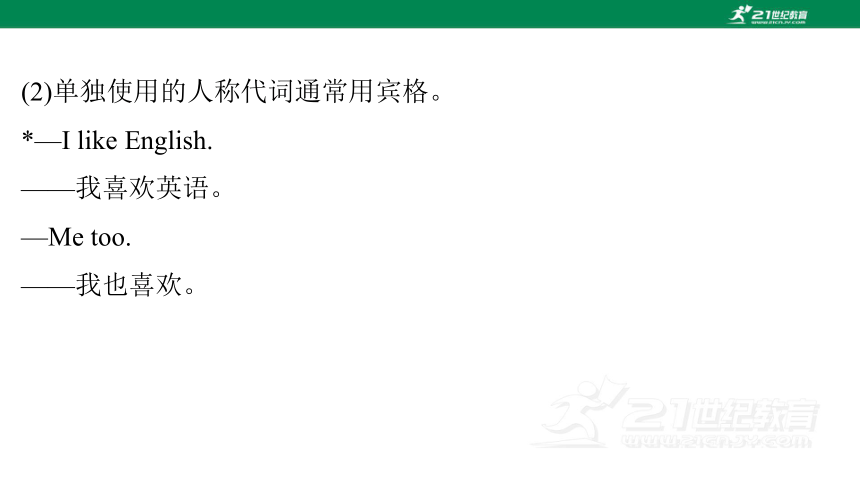
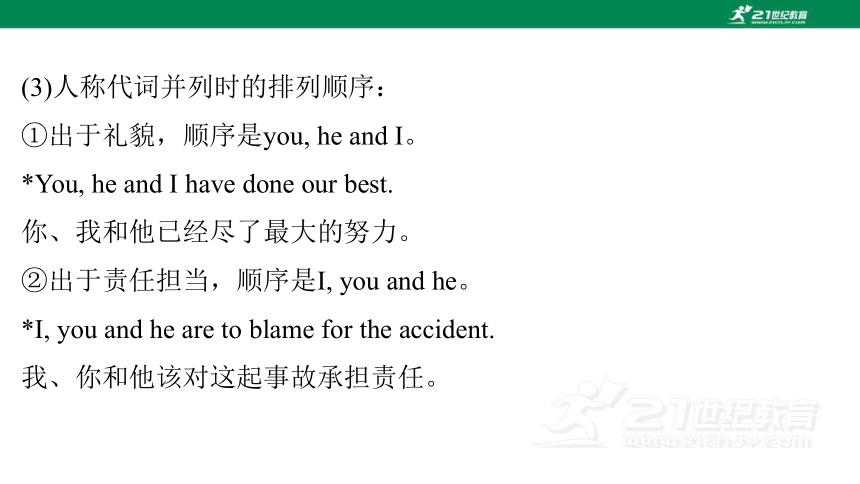
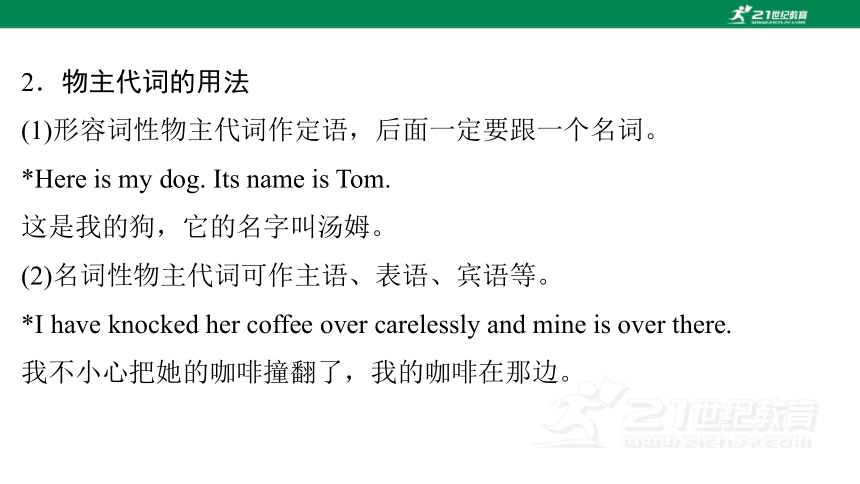
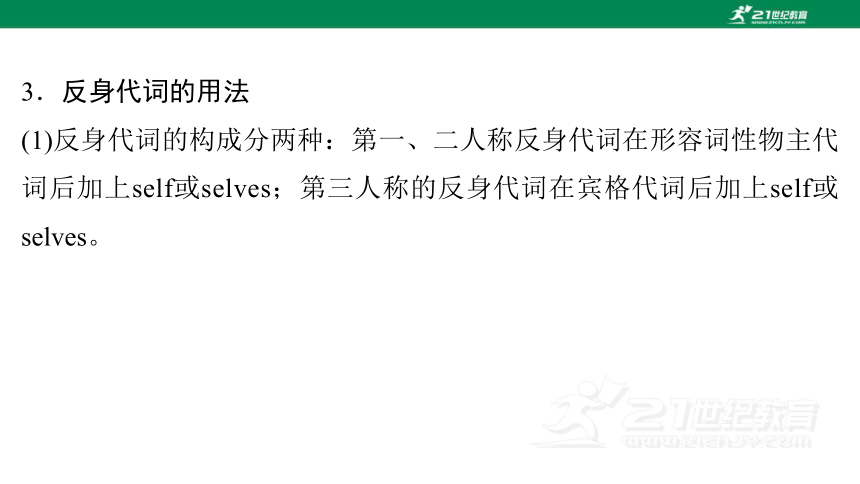
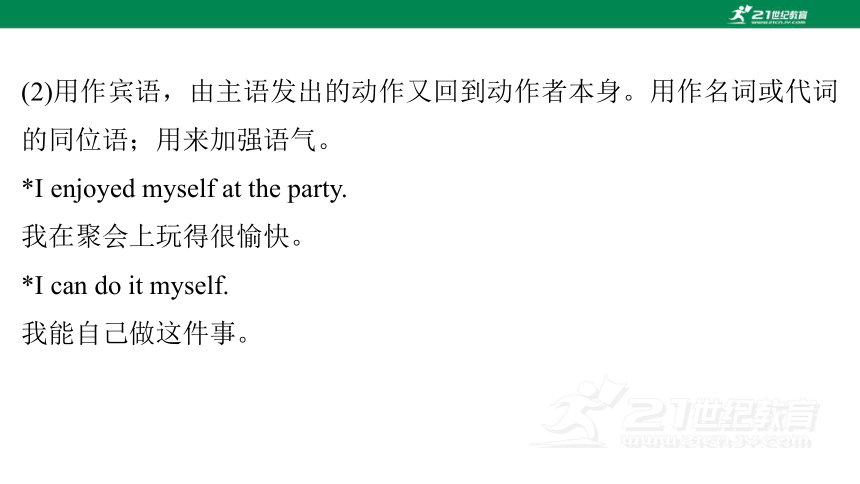
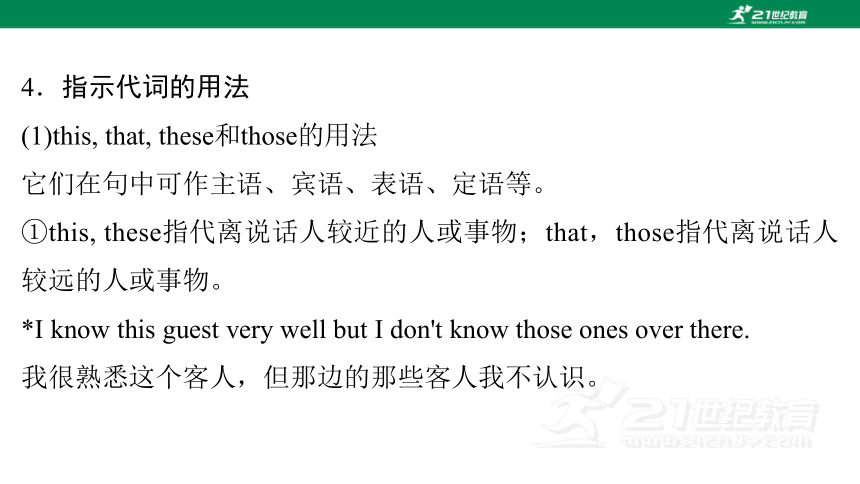
文档简介
(共44张PPT)
语法项目(二) 代词
知识梳理
PART
01
第一部分
项目 单数 复数
第一
人称 第二
人称 第三
人称 第一
人称 第二
人称 第三
人称
人称代词 主格 I you he,she,it we you they
宾格 me you him,her,it us you them
项目 单数 复数
第一
人称 第二
人称 第三
人称 第一
人称 第二
人称 第三
人称
物主
代词 形容
词性 my your his,her,its our your their
名词性 mine yours his,hers,its ours yours theirs
项目 单数 复数
第一人称 第二人称 第三人称 第一人称 第二人称 第三人称
反身
代词 myself yourself himself,herself,itself ourselves yourselves themselves
指示
代词 this, that, these, those, such, same
不定
代词 one, some, any, each, every, none, many, much, few, little, a few, a little, other, another, all, both, neither, either
1.人称代词的用法
(1)人称代词有主格和宾格之分,主格用作主语,宾格用作宾语或表语。用于than, as 之后或用于强调句中被强调时,用主格(较正式)和宾格(较口语化)均可以。
*He sings better than me.
他比我唱得好。
(2)单独使用的人称代词通常用宾格。
*—I like English.
——我喜欢英语。
—Me too.
——我也喜欢。
(3)人称代词并列时的排列顺序:
①出于礼貌,顺序是you, he and I。
*You, he and I have done our best.
你、我和他已经尽了最大的努力。
②出于责任担当,顺序是I, you and he。
*I, you and he are to blame for the accident.
我、你和他该对这起事故承担责任。
2.物主代词的用法
(1)形容词性物主代词作定语,后面一定要跟一个名词。
*Here is my dog. Its name is Tom.
这是我的狗,它的名字叫汤姆。
(2)名词性物主代词可作主语、表语、宾语等。
*I have knocked her coffee over carelessly and mine is over there.
我不小心把她的咖啡撞翻了,我的咖啡在那边。
3.反身代词的用法
(1)反身代词的构成分两种:第一、二人称反身代词在形容词性物主代词后加上self或selves;第三人称的反身代词在宾格代词后加上self或selves。
(2)用作宾语,由主语发出的动作又回到动作者本身。用作名词或代词的同位语;用来加强语气。
*I enjoyed myself at the party.
我在聚会上玩得很愉快。
*I can do it myself.
我能自己做这件事。
4.指示代词的用法
(1)this, that, these和those的用法
它们在句中可作主语、宾语、表语、定语等。
①this, these指代离说话人较近的人或事物;that,those指代离说话人较远的人或事物。
*I know this guest very well but I don't know those ones over there.
我很熟悉这个客人,但那边的那些客人我不认识。
②that和those指代前面提到的名词,that指代不可数名词,those指代复数名词。
*The shoes are more expensive in the shop than those in that shop.
这个店的鞋子比那个店的鞋子要贵。(those=the shoes)
③指上文提到的事情时,可用this 或 that,但是若要指将要发生或将要提到的事要用 this。
*The baby keeps crying. That/This is too bad.
那个婴儿一直在哭,真是太糟糕了。
④在打电话时,通常用 this 指自己,用that指对方。
*Hello. This is Jim. Is that John
喂,我是吉姆,你是约翰吗?
⑤this 和that 还可用作副词,用以修饰形容词或副词,意为“这么”“那么”,相当于 so。
*I've done only that much.
我所做的就那么多。
(2)it的用法
①指某种东西、抽象事物、不提性别的婴儿、身份不明的人。
*—Who is knocking on the door
——谁在敲门?
—It may be the milkman.
——可能是送牛奶的。
②指天气、时间、距离等。
*It is going to be fine this afternoon.
今天下午要天晴了。
③用作形式主语或形式宾语。
*It is vital to put up a sign reading “No Swimming” by the river.
在河边立个“严禁游泳”的牌子是至关重要的。
④用于固定句型。
a.It is/has been+时间段+since...句型。
b.It was/will (not) be+时间段+before...句型。
c.强调句型:it is/was...that/who...
*It was three years before he finished the work.
他花了三年才完成这项工作。
(3)so与such的用法
so指代一个句子或短语所表达的内容,意为“如此、这样”;such指代前面所叙述的人或事物。
*This apple pie is too sweet. Don't you think so
这个苹果派太甜了。你不这么认为吗?
*Such is the power of the TV that it can make a person suddenly famous.
这就是电视的力量,它可以使一个人突然出名。
5.不定代词的用法
(1)some与any
some用于肯定句中,any用于否定句、疑问句和条件句中。但是,在表示请求、邀请或征求意见的句子中,通常要用some而不用any。
*They don't have any way to solve it.
他们没有办法解决这个问题。
*Why don't you bring some flowers
你为什么不带些花来呢?
(2)both, either,each和neither
用于指两者。both后面所接名词是复数,either/each后面所接名词是单数,neither是否定含义。
*There are trees on each/either side(both sides) of the road.
路的两边都有树。
(3)all, none, every 和each
用于指三者或三者以上。all意为“所有的”,用于修饰可数或不可数名词;none意为“一个也没有、一点也没有”,表示否定,用于修饰可数或不可数名词;every/each意为“每个”,只用于修饰可数名词,each则强调逐个地;all和each既可单独使用,也可后接名词,还可后接of短语;而every 后必须接名词,既不能单独使用也不能后接of短语。
(4)other, the other, another, others和the others
指单数时若泛指,用another,意为“再一个、又一个”;若特指,用the other,意为“另外一个”。指复数时若泛指,用other+复数名词或others,意为“有一些、他人”;若特指用the other+复数名词或the others意为“所有其他人”。
(5)few, little, a few和a little的用法
few和a few用于修饰可数名词复数,few意为“几乎没有”,用于否定句;a few意为“有一点”,用于肯定句。little和a little用于修饰不可数名词,little意为“几乎没有”,用于否定句;a little意为“有一点”,用于肯定句。
(6)复合不定代词something, somebody, someone, anything, anybody, anyone, nothing, nobody, no one, everything, everybody, everyone等
①复合不定代词在句中作主语、宾语或表语,但不能作定语。其中something, someone和anything, anyone的区别与some 和 any 的区别一样,something, someone等用于肯定句,anything,anyone等一般用于否定句、疑问句或条件句。
②不定代词受定语修饰时,定语应置于其后。
③anyone, everyone等只能指人,不能指物,且其后一般不接of短语。any one, every one可以指人也可以指物,后接of短语。
④no one 与nobody意为“没有人”,用作主语时谓语用单数。而none 既可指人也可指物,意为“一点也没有,一个也没有”,其后通常接of短语,它作主语时指不可数名词,谓语用单数;指复数名词,谓语可用单数也可用复数。nothing意为“没有什么事情”。在问句中,no one回答who问句,nothing回答what问句,none回答how many或how much问句。
6.人称代词it,不定代词one和指示代词that
(1)it指上文提到的同一个事物(同类同物),复数用they或them。
(2)one通常指代单数可数名词,用于泛指上文提到过的名词(同类事物中的一个),相当于“a/an+单数可数名词”,复数用ones;the one相当于“the+单数可数名词”;the ones相当于those。
(3)that指不可数名词或指代上文中提到的情况(同名异物)。
技巧点拨
PART
02
第二部分
技法1 人称、物主、反身代词词类:“成分”是关键
1.如果句中缺主语,则用人称代词的主格。
2.如果句中缺宾语或表语,则用人称代词的宾格。
3.如果句中缺定语,则用形容词性物主代词。
4.如果主语和宾语代表同一个人或物,宾语则用反身代词。
技法2 不定代词类:“范围”要搞清
1.二者选其一,用either;都不选,用neither;都选,用both。
2.三者或三者以上的任何一个,用any;都不选,用none;都选,用all。
技法3 it类:“指代”要辨明
1.如果指代上下文同一事物,用it。
2.如果指代天气、时间、距离、地点用it。
3.如果作形式主语或形式宾语用it。
专题训练
PART
03
第三部分
Ⅰ. 单句语法填空
1.I'd appreciate ____________ if you could let me know in advance whether or not you will come.
句意:如果您能提前通知我来或者不来的话,我将会很感激。动词appreciate接if从句时,后面须用it作形式宾语,指代后面的if从句。
it
2.A smile costs ____________,but gives much.
句意:微笑不需要付出什么,但却可以给予很多。由句中转折词but及gives much可知,应填nothing。
nothing
3.She'd lived in London and Manchester,but she liked ____________ and moved to Cambridge.
句意:她曾经住在伦敦和曼彻斯特,但是她哪个也不喜欢,就搬到了剑桥。由句意可知,她对这两座城市都不喜欢,用否定代词neither,表示“两者都不”。
neither
4.However, quite a few others,especially ____________ in the countryside,would fix a lucky date so that their marriage would have “Double Happiness”.
考查代词。根据语境可知,空处指那些在农村地区的人,表示复数,故用代词those。
those
5.She recognized ____________(I) potential and showed me that I could write with creativity and enthusiasm.
考查物主代词。分析句子结构可知,此处的potential是名词,意为“潜力”,故此处应用形容词性物主代词修饰名词。
my
6.When the gorillas and I frightened each other, I was just glad to find ____________(they) alive.
考查代词之人称代词。分析句子结构可知,此处要用代词作find的宾语,故要用人称代词的宾格。they的宾格为them。
them
7.“She thought I had hurt____________(I),” says Pahlsson.
句意:帕尔孙说:“她认为我伤到了自己。”主语和宾语为同一对象时,宾语要用反身代词,故此处填myself。
myself
8.By that time,the panda no longer needed ____________(it) mother for food.
句意:到那时,这只熊猫不再需要从它的母亲那里获取食物。此处用形容词性物主代词its修饰mother。
its
9.In many ways,the education system in the US is not very different from ____________ in the UK.
句意:在很多方面,美国的教育体系和英国的教育体系很不一样。这里指代前面的名词education system,所以用that。
that
10.The meeting will be held in September,but ____________ knows the date for sure.
句意:会议将在九月举行,但是没有人知道确切的日期。根据句中的转折词but可知,后面的句子应为否定含义,所以用nobody。
nobody
Ⅱ.语法填空
在空白处填入1个适当的代词。
“Without the ball,I'm half complete of 1.________,”Luis Figo,one of the world's greatest football players once said.
The Portuguese played his first international match in 1991 at the age of 18 and has kept scoring ever since.
myself
He reached a new mark on February 18 by playing 2.________ hundredth match for his national team in a friendly match against England.A crowd of more than 30,000 fans watched and cheered for 3.________ in Lisbon.“Figo,Figo,”4.________ (all,both) shouted excitedly when he walked onto the field.
his
him
all
The Real Madrid player,31,wanted to help his country in Euro 2004 and to win 5.________ (another,other) Spanish Cup with Real Madrid.Madrid bought Figo from FC Barcelona for 82.4 million dollars in 2000,and he showed 6.________ (everyone,anyone) what a great player he was by winning FIFA's Footballer of the Year award in 2001.
another
everyone
“Figo works like an artist and has the skills to be the most complete player,”said FIFA President Joseph Blatter in 2001.“Figo 7.________ is a real leader who always tries 8.________ best on the field and a good team player.He doesn't have any problems working together with his teammate at Real Madrid,star footballer David Beckham.”In fact,Figo was the first 9.________ to welcome Beckham when he arrived.“We have a strong team,and we can help one 10.________ and work together to be successful,”Figo said.
himself
his
one
another
语法项目(二) 代词
知识梳理
PART
01
第一部分
项目 单数 复数
第一
人称 第二
人称 第三
人称 第一
人称 第二
人称 第三
人称
人称代词 主格 I you he,she,it we you they
宾格 me you him,her,it us you them
项目 单数 复数
第一
人称 第二
人称 第三
人称 第一
人称 第二
人称 第三
人称
物主
代词 形容
词性 my your his,her,its our your their
名词性 mine yours his,hers,its ours yours theirs
项目 单数 复数
第一人称 第二人称 第三人称 第一人称 第二人称 第三人称
反身
代词 myself yourself himself,herself,itself ourselves yourselves themselves
指示
代词 this, that, these, those, such, same
不定
代词 one, some, any, each, every, none, many, much, few, little, a few, a little, other, another, all, both, neither, either
1.人称代词的用法
(1)人称代词有主格和宾格之分,主格用作主语,宾格用作宾语或表语。用于than, as 之后或用于强调句中被强调时,用主格(较正式)和宾格(较口语化)均可以。
*He sings better than me.
他比我唱得好。
(2)单独使用的人称代词通常用宾格。
*—I like English.
——我喜欢英语。
—Me too.
——我也喜欢。
(3)人称代词并列时的排列顺序:
①出于礼貌,顺序是you, he and I。
*You, he and I have done our best.
你、我和他已经尽了最大的努力。
②出于责任担当,顺序是I, you and he。
*I, you and he are to blame for the accident.
我、你和他该对这起事故承担责任。
2.物主代词的用法
(1)形容词性物主代词作定语,后面一定要跟一个名词。
*Here is my dog. Its name is Tom.
这是我的狗,它的名字叫汤姆。
(2)名词性物主代词可作主语、表语、宾语等。
*I have knocked her coffee over carelessly and mine is over there.
我不小心把她的咖啡撞翻了,我的咖啡在那边。
3.反身代词的用法
(1)反身代词的构成分两种:第一、二人称反身代词在形容词性物主代词后加上self或selves;第三人称的反身代词在宾格代词后加上self或selves。
(2)用作宾语,由主语发出的动作又回到动作者本身。用作名词或代词的同位语;用来加强语气。
*I enjoyed myself at the party.
我在聚会上玩得很愉快。
*I can do it myself.
我能自己做这件事。
4.指示代词的用法
(1)this, that, these和those的用法
它们在句中可作主语、宾语、表语、定语等。
①this, these指代离说话人较近的人或事物;that,those指代离说话人较远的人或事物。
*I know this guest very well but I don't know those ones over there.
我很熟悉这个客人,但那边的那些客人我不认识。
②that和those指代前面提到的名词,that指代不可数名词,those指代复数名词。
*The shoes are more expensive in the shop than those in that shop.
这个店的鞋子比那个店的鞋子要贵。(those=the shoes)
③指上文提到的事情时,可用this 或 that,但是若要指将要发生或将要提到的事要用 this。
*The baby keeps crying. That/This is too bad.
那个婴儿一直在哭,真是太糟糕了。
④在打电话时,通常用 this 指自己,用that指对方。
*Hello. This is Jim. Is that John
喂,我是吉姆,你是约翰吗?
⑤this 和that 还可用作副词,用以修饰形容词或副词,意为“这么”“那么”,相当于 so。
*I've done only that much.
我所做的就那么多。
(2)it的用法
①指某种东西、抽象事物、不提性别的婴儿、身份不明的人。
*—Who is knocking on the door
——谁在敲门?
—It may be the milkman.
——可能是送牛奶的。
②指天气、时间、距离等。
*It is going to be fine this afternoon.
今天下午要天晴了。
③用作形式主语或形式宾语。
*It is vital to put up a sign reading “No Swimming” by the river.
在河边立个“严禁游泳”的牌子是至关重要的。
④用于固定句型。
a.It is/has been+时间段+since...句型。
b.It was/will (not) be+时间段+before...句型。
c.强调句型:it is/was...that/who...
*It was three years before he finished the work.
他花了三年才完成这项工作。
(3)so与such的用法
so指代一个句子或短语所表达的内容,意为“如此、这样”;such指代前面所叙述的人或事物。
*This apple pie is too sweet. Don't you think so
这个苹果派太甜了。你不这么认为吗?
*Such is the power of the TV that it can make a person suddenly famous.
这就是电视的力量,它可以使一个人突然出名。
5.不定代词的用法
(1)some与any
some用于肯定句中,any用于否定句、疑问句和条件句中。但是,在表示请求、邀请或征求意见的句子中,通常要用some而不用any。
*They don't have any way to solve it.
他们没有办法解决这个问题。
*Why don't you bring some flowers
你为什么不带些花来呢?
(2)both, either,each和neither
用于指两者。both后面所接名词是复数,either/each后面所接名词是单数,neither是否定含义。
*There are trees on each/either side(both sides) of the road.
路的两边都有树。
(3)all, none, every 和each
用于指三者或三者以上。all意为“所有的”,用于修饰可数或不可数名词;none意为“一个也没有、一点也没有”,表示否定,用于修饰可数或不可数名词;every/each意为“每个”,只用于修饰可数名词,each则强调逐个地;all和each既可单独使用,也可后接名词,还可后接of短语;而every 后必须接名词,既不能单独使用也不能后接of短语。
(4)other, the other, another, others和the others
指单数时若泛指,用another,意为“再一个、又一个”;若特指,用the other,意为“另外一个”。指复数时若泛指,用other+复数名词或others,意为“有一些、他人”;若特指用the other+复数名词或the others意为“所有其他人”。
(5)few, little, a few和a little的用法
few和a few用于修饰可数名词复数,few意为“几乎没有”,用于否定句;a few意为“有一点”,用于肯定句。little和a little用于修饰不可数名词,little意为“几乎没有”,用于否定句;a little意为“有一点”,用于肯定句。
(6)复合不定代词something, somebody, someone, anything, anybody, anyone, nothing, nobody, no one, everything, everybody, everyone等
①复合不定代词在句中作主语、宾语或表语,但不能作定语。其中something, someone和anything, anyone的区别与some 和 any 的区别一样,something, someone等用于肯定句,anything,anyone等一般用于否定句、疑问句或条件句。
②不定代词受定语修饰时,定语应置于其后。
③anyone, everyone等只能指人,不能指物,且其后一般不接of短语。any one, every one可以指人也可以指物,后接of短语。
④no one 与nobody意为“没有人”,用作主语时谓语用单数。而none 既可指人也可指物,意为“一点也没有,一个也没有”,其后通常接of短语,它作主语时指不可数名词,谓语用单数;指复数名词,谓语可用单数也可用复数。nothing意为“没有什么事情”。在问句中,no one回答who问句,nothing回答what问句,none回答how many或how much问句。
6.人称代词it,不定代词one和指示代词that
(1)it指上文提到的同一个事物(同类同物),复数用they或them。
(2)one通常指代单数可数名词,用于泛指上文提到过的名词(同类事物中的一个),相当于“a/an+单数可数名词”,复数用ones;the one相当于“the+单数可数名词”;the ones相当于those。
(3)that指不可数名词或指代上文中提到的情况(同名异物)。
技巧点拨
PART
02
第二部分
技法1 人称、物主、反身代词词类:“成分”是关键
1.如果句中缺主语,则用人称代词的主格。
2.如果句中缺宾语或表语,则用人称代词的宾格。
3.如果句中缺定语,则用形容词性物主代词。
4.如果主语和宾语代表同一个人或物,宾语则用反身代词。
技法2 不定代词类:“范围”要搞清
1.二者选其一,用either;都不选,用neither;都选,用both。
2.三者或三者以上的任何一个,用any;都不选,用none;都选,用all。
技法3 it类:“指代”要辨明
1.如果指代上下文同一事物,用it。
2.如果指代天气、时间、距离、地点用it。
3.如果作形式主语或形式宾语用it。
专题训练
PART
03
第三部分
Ⅰ. 单句语法填空
1.I'd appreciate ____________ if you could let me know in advance whether or not you will come.
句意:如果您能提前通知我来或者不来的话,我将会很感激。动词appreciate接if从句时,后面须用it作形式宾语,指代后面的if从句。
it
2.A smile costs ____________,but gives much.
句意:微笑不需要付出什么,但却可以给予很多。由句中转折词but及gives much可知,应填nothing。
nothing
3.She'd lived in London and Manchester,but she liked ____________ and moved to Cambridge.
句意:她曾经住在伦敦和曼彻斯特,但是她哪个也不喜欢,就搬到了剑桥。由句意可知,她对这两座城市都不喜欢,用否定代词neither,表示“两者都不”。
neither
4.However, quite a few others,especially ____________ in the countryside,would fix a lucky date so that their marriage would have “Double Happiness”.
考查代词。根据语境可知,空处指那些在农村地区的人,表示复数,故用代词those。
those
5.She recognized ____________(I) potential and showed me that I could write with creativity and enthusiasm.
考查物主代词。分析句子结构可知,此处的potential是名词,意为“潜力”,故此处应用形容词性物主代词修饰名词。
my
6.When the gorillas and I frightened each other, I was just glad to find ____________(they) alive.
考查代词之人称代词。分析句子结构可知,此处要用代词作find的宾语,故要用人称代词的宾格。they的宾格为them。
them
7.“She thought I had hurt____________(I),” says Pahlsson.
句意:帕尔孙说:“她认为我伤到了自己。”主语和宾语为同一对象时,宾语要用反身代词,故此处填myself。
myself
8.By that time,the panda no longer needed ____________(it) mother for food.
句意:到那时,这只熊猫不再需要从它的母亲那里获取食物。此处用形容词性物主代词its修饰mother。
its
9.In many ways,the education system in the US is not very different from ____________ in the UK.
句意:在很多方面,美国的教育体系和英国的教育体系很不一样。这里指代前面的名词education system,所以用that。
that
10.The meeting will be held in September,but ____________ knows the date for sure.
句意:会议将在九月举行,但是没有人知道确切的日期。根据句中的转折词but可知,后面的句子应为否定含义,所以用nobody。
nobody
Ⅱ.语法填空
在空白处填入1个适当的代词。
“Without the ball,I'm half complete of 1.________,”Luis Figo,one of the world's greatest football players once said.
The Portuguese played his first international match in 1991 at the age of 18 and has kept scoring ever since.
myself
He reached a new mark on February 18 by playing 2.________ hundredth match for his national team in a friendly match against England.A crowd of more than 30,000 fans watched and cheered for 3.________ in Lisbon.“Figo,Figo,”4.________ (all,both) shouted excitedly when he walked onto the field.
his
him
all
The Real Madrid player,31,wanted to help his country in Euro 2004 and to win 5.________ (another,other) Spanish Cup with Real Madrid.Madrid bought Figo from FC Barcelona for 82.4 million dollars in 2000,and he showed 6.________ (everyone,anyone) what a great player he was by winning FIFA's Footballer of the Year award in 2001.
another
everyone
“Figo works like an artist and has the skills to be the most complete player,”said FIFA President Joseph Blatter in 2001.“Figo 7.________ is a real leader who always tries 8.________ best on the field and a good team player.He doesn't have any problems working together with his teammate at Real Madrid,star footballer David Beckham.”In fact,Figo was the first 9.________ to welcome Beckham when he arrived.“We have a strong team,and we can help one 10.________ and work together to be successful,”Figo said.
himself
his
one
another
同课章节目录
